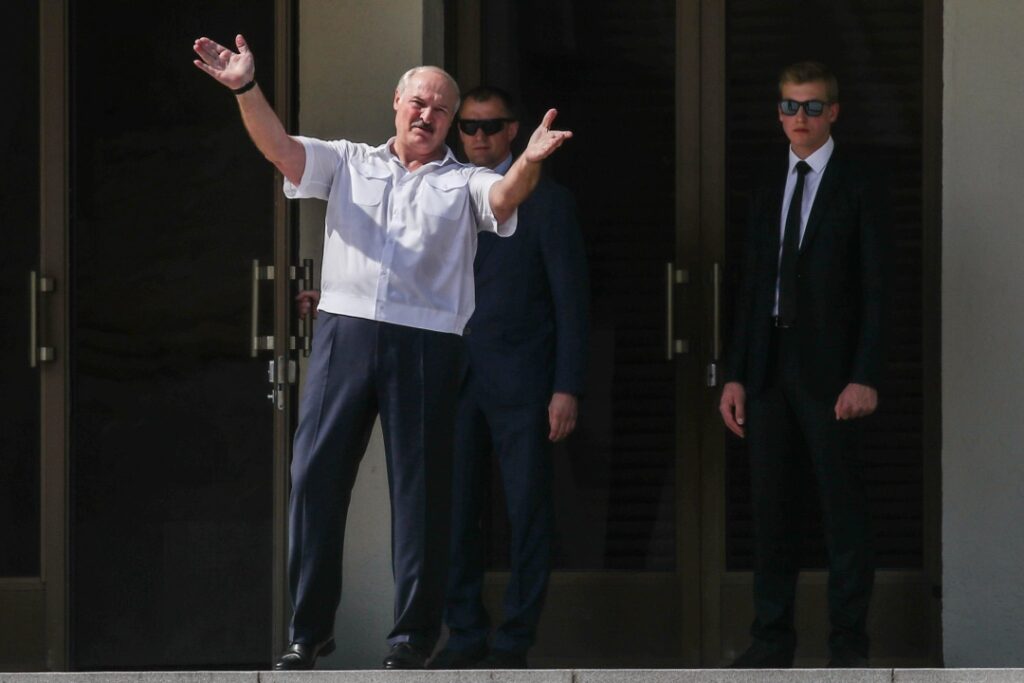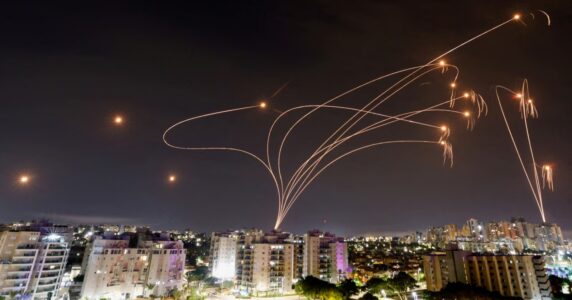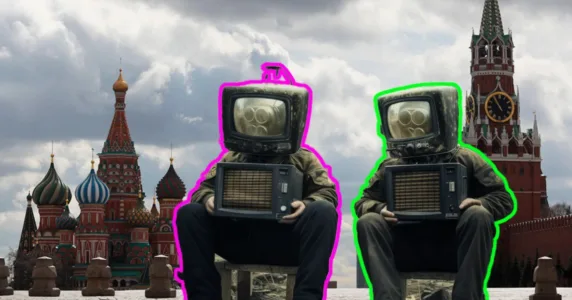Navigation and useful materials
Recently, there has been an expansion of Russian “hybrid troops”. Now, Ukraine should expect propaganda and misinformation spread coming from the North too.
Up until Summer 2021, Belarus was considered if not an ally of Ukraine in its confrontation with Russia, then at least a neutral buffer zone. Officially, Belarus took a position of an “impartial” neighbour. However, the incident with the hijacked plane and the illegal arrest of the Belarusian independent journalist Roman Protasevich, widely condemned as an act of international aviation terrorism, confirmed that Belarus has finally chosen the side in the Russian-Ukrainian war.
Alexander Lukashenko and Vladimir Putin met last Friday in Sochi, gathering for the third time since the beginning of the year. Two leaders talked until late night. Actually, according to the photo and video reports, there were three of them: Putin, Lukashenko, and the youngest son of the Belarusian President.

Mostly, the meeting went behind closed doors and neither side disclosed details. For the record, Lukashenko blamed the West for putting pressure on the Belarusian airlines Belavia after the interception of the European airlines plane, promising to provide Putin with the flight recorder details that he, supposedly, brought for the meeting. As Lukashenko explained to his counterpart, “so that you understand what is happening. There is an attempt to heat the situation to the degree of the last August’s circumstances” (when mass protests took place after the presidential election in Belarus ― ed.). However, what exactly the flight recorder that was on board was supposed to disclose yet left unknown.
In turn, Putin mentioned that “the water is getting warmer” which, in his opinion, was likely to help in achieving the goals of the leaders’ meeting. He did not specify, however, what exactly the goals were. “We are working on establishing the Union state, we are moving towards the goal as agreed, following the interests of both Belarus and Russia. We are moving in this direction with confidence,” ― the Russian President reaffirmed.
According to the Wall Street Journal, the isolation in which Lukashenko put himself due to the forced plane landing, pushes him even closer to Putin while giving the Kremlin a chance to finally achieve the long-awaited “deeper integration” with Minsk. According to the publication, this became even more obvious after Putin expressed support for his Belarusian counterpart in Sochi ― right at a time when the rest of the world turned away from him.
The telegram channel “Pool of the First” which is hosted by Natalia Eismont, Lukashenko’s spokeswoman, called the meeting a “working sea-bathing”. The journalist’s attention was drawn to the fact that Putin called on Lukashenko to go swimming but did not join him. The Kremlin replied that they cannot explain why this happened, as the subject falls under the President’s private issues category.
During the meeting, Putin advertised holiday resorts at the Black Sea coast for Belarusians. The leaders agreed to launch new Belavia flights that would connect Belarus and Russia. Presumably, a proposal to open direct air connections between Belarus and the occupied Crimea was put on the table too. However, as Belavia CEO Igor Cherginets previously mentioned, talking on Russia’s “Solovyov Live” YouTube channel, the company will not send planes to Crimea until there is a “political recognition of Crimea as a [part of] Russia”. Probably, it is exactly the lack of political recognition why Lukashenko was left swimming alone and had to leave earlier than planned. Nevertheless, Lukashenko returned back home holding half a billion dollars granted by Putin. Until now, the President of Belarus has not officially recognised Crimea as a part of Russia. Although previously, when expressing his views on this issue, he argued that the peninsula is now considered de facto under the Kremlin’s control while Ukraine is allegedly to be blamed for its seizure.
Observers believe that Putin’s meeting with the U.S. President Joe Biden which is scheduled for June is likely to shed more light on further developments in relations between Russia and Belarus. Obviously, Lukashenko does not seem happy about the idea that Belarus will be discussed during the meeting him being absent. On the eve of his visit to Sochi, Lukashenko spoke about the approaching meeting with a not-so-hidden annoyance: “I want to invite them publicly: if they want to discuss the issue of Belarus, let them come here. I will meet them with dignity, we will discuss all the issues.” He added that when last time Russian and American Presidents talked on Belarus, Putin made a phone call him afterwards, expressing a kind of excuse for “discussing Belarus without permission.”
Clearly, the role of a “vassal” seems to be uncomfortable for Lukashenko as he pretends to act from the position of a much more considerable player. His ambitions remain the only factor that prevents Lukashenko from complete “surrender” of Belarus. Nevertheless, this does not make him either an ally of Ukraine or a neutral party.
Meanwhile, the so-called LNR and the Belarusian KGB almost simultaneously delivered statements on the detainment of Roman Protasevych, declaring him a war criminal.

The statement made by Ivan Tertel, the head of the Belarusian KGB, defines Ukraine’s defence in face of Russian aggression as a crime: “It is undeniable that this person [Protasevich] fully meets the definition of a terrorist, a mercenary militant, a participant of the bloody events associated with atrocities and deaths of civilians in the Southeastern Ukraine,” ― Tertel said on May 26.
In this statement, Tertel points at Protasevich’s alleged participation in war actions in 2014-2015, claiming that he was engaged with Ukrainian forces as a volunteer, as depicted by Belarusian and Russian propaganda. However, there is no factual evidence of the then-19-years-old journalist’s involvement in the fighting. According to Protasevich himself, as well as to several other sources, it is known that he worked as a photojournalist in the Anti-terrorist Operation zone. Furthermore, as we know from our sources, the Belarusian KGB was well aware of Protasevich’s presence there long before.
After Protasevich returned to Belarus from Donbas, he was searched and interrogated. Also, a criminal investigation was initiated, however, the сase was soon closed. Protasevich continued to live and work in Belarus without any consequences.
Now, declaring Protasevich a “combatant”, “terrorist”, and a murderer of civilians, the Belarusian authorities put great effort to divert attention from their own crime ― the seizure of the European passenger plane. Despite this, Belarus is renouncing its neutral status on the Russian-Ukrainian war by fully adopting the Russian narrative.
It is likely that the vague phrases such as “bloody events” which, accordingly to the Belarusian version, led to the “atrocities” and “deaths of the civilian population”, are used to shift the blame on Ukraine, presenting defensive actions as an act of aggression. From Ukraine’s perspective, this can be considered as a radical shift in the Belarusian foreign policy, indicating the emergence of the new threats to Ukraine and pointing at the vulnerability of its Northern borders. When acting in tandem with the so-called Luhansk People’s Republic, Belarus puts itself in the place of a third “People’s Republic”.
Formally, Lukashenko did not recognise Russia’s occupation of Crimea as an alleged legitimate accession. Shortly before the August 9 election last year, in an interview with Dmitry Gordon, Lukashenko claimed he would not give up Crimea. Instead, he would rather drown in blood any attempts to tear off a piece of the territory. Earlier, at the inauguration of Petro Poroshenko in June 2014, he argued that “those gangsters who fight against Ukrainians must be destroyed”. Also, in 2015 Lukashenko talked about the so-called “Russian world” (“Russkiy mir”) as of “propaganda nonsense”. At the time, such statements were widely quoted and resonated in the Ukrainian information space.
When analysing the content of the state Belarusian media up until Summer 2020, it can be seen that some of the media platforms kept silent about the war in Ukraine at all, while others covered the topic in a pretty much restrained manner in comparison to Russian propaganda. For instance, those that covered the topic avoided labelling such as “Bandera fascists”. (However, there were no obstacles for the Russian propaganda in Belarus, and as a result, for many Belarusians interested in what was happening in Ukraine it became the main source of information).
In turn, single cases of the persecuted Belarusian volunteers who fought on the side of Ukraine were mostly considered as ordinary criminal prosecution cases ― as if they were not politically motivated. When Belarus legalised persecution for “mercenaries” (consider that this term includes any form of participation in armed conflicts outside the country regardless of motivation), the Belarusian security forces publicly stated that they would treat the parties of any conflict equally. In reality, it did not happen. Although on the large scale, the authorities managed at least to appear unbiased.
All of these actions, including Lukashenko’s procrastination on the integration issue with Russia as well as the conflicts that took place on a regular basis were perceived from Ukraine’s perspective as a sort of “opposition attitude” towards Putin’s intentions to annex Belarus. Nevertheless, this did not prevent the Belarusian secret services from sharing data with the Russian institutions, nor the military from conducting joint exercises.
In fact, in 1994, Lukashenko rose to power, promising a close integration with Russia. The political force that first relied on him was the Slavic Assemblage party called “White Rus” (often abbreviated from Russian as “SS White Rus”) which advocated under the imperial black and yellow flag for the “renewal of the Russian state within its natural historical borders” and the merger of “White Russians, Great Russians and Little Russians”. The “combat” wing of the party was represented by the neo-Nazi movement RNU (Russian National Unity), squads of which patrolled the Belarusian streets together with the police in the late 1990s. These organisations were overseen by Col. Vladimir Zametalin, a native Russian from Tula. Zametalin graduated from the Donetsk Higher Military-Political School, later served as a political instructor in Germany, in the Far East, and afterwards became the main ideologist of Lukashenko’s regime.
An outspoken Belarusian-phobe, he stepped on the stage as the main mastermind of the 1995 referendum ― in times when Belarus was set on course of the unification with Russia, while Russian was given the status of the state language, and the white-red-white flag along with Pahonia emblem were replaced by the Soviet symbols. The former ones were disgraced, literally torn apart and then sold for $10 per piece in a live TV broadcast.
In turn, Lukashenko has been actively engaged in promotion and integration deepening with Moscow, just until Putin came to power. In 1995, Lukashenko declared: “Belarus is seen as the saviour of Slavic civilisation and we are obliged to save this civilisation”. Formally, in 1999, a unified state was created ― the Union State of Russia and Belarus. In the same year, as the chairman of the Supreme Council of the newly-established state, Lukashenko flew to Belgrade where he made a sensational political proposal, suggesting the accession of Yugoslavia as a member of the Union. On the backdrop, the official Belarusian propaganda criticised Russia’s top leadership for its weakness while portraying Lukashenko as a determined world-class politician.
As the Swedish-American historian Per Anders Rudling wrote, since the beginning of his political career, Lukashenko demonstrated his affection to the red-browns. (In this colour scheme, red refers to socialism while brown ― to fascism). In turn, members of this movement supported Lukashenko’s plans to create an alliance with Russia aimed at the restoration of the USSR in one form or another.
However, after the change of power in Russia, the political situation shifted dramatically: “The coming to power of Vladimir Putin became a turning point in Belarusian-Russian relations. In the person of Putin, Lukashenko saw a competitor for the position of integration processes’ leader. Putin not only stole Lukashenko’s political platform. He has surpassed the Belarusian leader in his enthusiasm for reintegration. Putin’s plan was to eliminate Lukashenko’s political order and destroy him as a political rival”.
So, expectedly, Lukashenko’s enthusiasm towards integration incentives rapidly began to wane. Instead, he tried on a role of an “independence defender”, establishing the image of the “people’s president” and the enemy of the Kremlin oligarchs.
Thus, Lukashenko’s opposing attitude towards integration with Russia and the defence of Belarus’ sovereignty, along with his personal struggle in relations with Putin, appeared to be not a struggle for true independence but rather a competition for the place at the hierarchical system, the “King of the Hill” game.
After Summer 2020, things have changed dramatically once again. This does not mean, however, that we had a chance to see a “new” Lukashenko. Instead, there was the “original” Lukashenko on stage and the image he established in the 1990s. In his public speech, he now called Belarus a “bloody stump of a great empire”, an “outpost of the New Eurasia” and so on. Lukashenko went that far that once he even referred to a trench, imagining himself fighting against all external enemies together with Putin, “side by side, shoulder to shoulder”.
There also was a dramatic shift in the Belarusian state propaganda’s attitude towards the situation in Ukraine. Metaphorically speaking, a bridge was built, connecting the 1990s with the 2020s. Hryhoriy Azaryonok recently became a key propaganda figure. He is known as the hereditary propagandist of the “Russian world”, being a son of Yuri Azaryonok, one of the co-founders of the above-mentioned SS “White Rus” party. Hryhoriy is also known as a fan of Russian tsars, black-hundredists, NKVD, and SMERSH.
Apart from the direct calls for brutal massacres of protesters and the “enemies of the people” (young propagandist demonstrated their photos against the backdrop of the hangman’s knot) ― before his appearance on Belarusian TV, such kind of anti-Ukrainian propaganda was not even allowed: “a dying country of beggars”, “a pirated Banderastan” where “children are sold for parts on an industrial scale and women are exported to the European brothels almost officially”. These are just a few examples. From the propagandist’s perspective, President Zelensky embodies the “new Gauleiter”, “Biden’s minion”, and a murderer of children. In turn, the Western world is depicted as a “bestiary of freaks and degenerates”, from which Belarus should separate itself with an “iron curtain”.
It was Azaryonok who first slandered Protasevich as a “combatant” last Autumn. According to the biography, invented by the propagandist himself, Protasevich acted not as a journalist but as a fighter with the Azov battalion where he allegedly “served as Deputy Commander of the Second Assault company”. A fully fabricated story later was spread by Russian propagandists, bot factories, and the so-called “useful idiots” in the Western countries.
“The most fierce supporters of the Fuehrer were the Banderites. They killed them all ― Poles, Ukrainians, Russians, Jews. Butchered whole villages. They formed SS divisions. And today, Bandera’s Ukraine puts the greatest effort into serving the new Reich,” ― this is just an excerpt of the Azaryonok’s speech on Belarusian TV.
At the same time, he is calling on Ukrainians to “come back home”: “Ukrainians, our dear brothers! Remember our common great past. Come back to the family.” Clearly, we are dealing with an example of the typical Russian propaganda methods which include the demonisation of the Ukrainian government, Ukrainian state. At the same time, however, there can be seen a reference to “the good people” who simply became victims of the “coup d’etat”.

Thus, it can be assumed that Lukashenko’s regime has only gone through a full cycle in its evolution. In a critical situation, the regime has returned to the “factory default settings”. It is also understandable that such a reversal poses additional threats to Ukraine ― specifically, by increasing the potentially dangerous section of the state border for another thousand kilometres.
If you have found a spelling error, please, notify us by selecting that text and pressing Ctrl+Enter.



